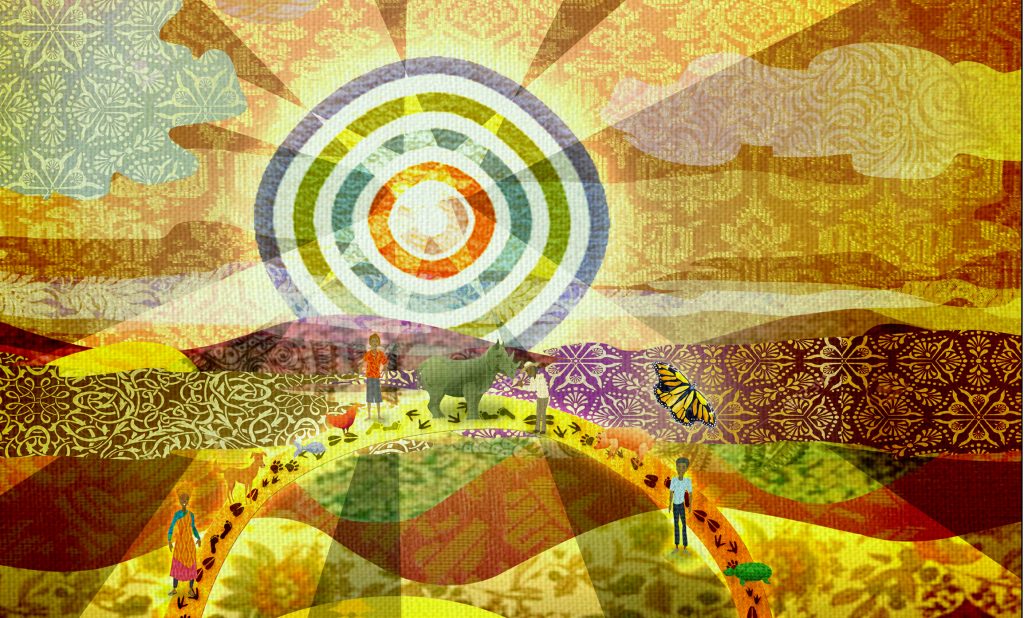World Environment Day: ‘Connecting people to nature’
- Published:
"Connecting people to nature" – this year’s global theme for World Environment Day. It both reflects what is perhaps our most fundamental problem and points to how we can solve it.
 The problem is that we as humankind have allowed ourselves, in our heads and in our hearts, to become disconnected from the Earth and the rest of creaturekind. The 2017 World Environment Day theme reflects this problem in as much as it begs the question of how one connects what is already intrinsically connected – and why it would be necessary to do so. Even though objectively we cannot be other than connected to the Earth and all life, ‘Connecting people to nature’ points to a solution to the extent that we have come to think and feel and behave as if we are not, we therefore need to re-connect.
The problem is that we as humankind have allowed ourselves, in our heads and in our hearts, to become disconnected from the Earth and the rest of creaturekind. The 2017 World Environment Day theme reflects this problem in as much as it begs the question of how one connects what is already intrinsically connected – and why it would be necessary to do so. Even though objectively we cannot be other than connected to the Earth and all life, ‘Connecting people to nature’ points to a solution to the extent that we have come to think and feel and behave as if we are not, we therefore need to re-connect.
Separation between people and nature – a human/nature dualism – has become deeply embedded in Western culture and modes of thought. On the coattails of the Western-based politico-economic system that is now dominant globally, the ideological separation between people and nature has infected the rest of the world.
For as long as ‘the environment’ and ‘nature’ are perceived to be external to us, separate from us, we feel free to use ‘them’ as mere resources, objects with no value other than for our use and consumption. The less we feel connected to the earth, to what grows in the earth and to animals, the less we care and the easier it is for us to act – and feel justified in acting – without consideration, kindness or compassion towards Mother Earth and our fellow creatures. This results not only in untold suffering, death and destruction for ‘others’, but for ourselves as humans because the Earth is our common home too and the violence that we visit on the Earth and on the web of life that she supports, we visit on ourselves. There is only one community of life on Earth and we humans are blessed to be members.
 Connecting, re-connecting, connecting more deeply and more consciously with one another as part of – not apart from – nature, feels good. This is because ‘nature’ is where we belong. In ‘nature’ we feel most deeply at home. Whatever our particular faith or form of spirituality, for most of us, if we experience the divine anywhere, it is in ‘nature’, beyond the human-built environment.
Connecting, re-connecting, connecting more deeply and more consciously with one another as part of – not apart from – nature, feels good. This is because ‘nature’ is where we belong. In ‘nature’ we feel most deeply at home. Whatever our particular faith or form of spirituality, for most of us, if we experience the divine anywhere, it is in ‘nature’, beyond the human-built environment.
Connecting, re-connecting, connecting more deeply and more consciously as part of nature leads to greater awareness and to enhanced mindfulness but most importantly these lead us on to changing how we relate to, and treat, our fellow members of Earth’s community of life and how we behave generally towards the Earth as our only home. (For inspiration see https://www.youtube.com/watch?v=d_g18-2kQbI)
Let us use this World Environment Day to reflect on what all this means for us as individuals and as faith communities. There is so much that we need to do. There is so much that we need to do differently.
To give expression to our caring, we need to be active and we need to be creative. Whatever we are already doing, we can do more and we can do better.
- Reduce, re-use, recycle – including water
- Break the cycle of violence – including . . .
- through how we raise the children in our lives,
- through what we choose to eat and, more pertinently, not eat, and
- through refusing to go along with a culture that is permissive of abuse and violence against anyone, be they children, women, members of the LGBTIQ community, ‘foreigners’, or our fellow creatures; (For inspiration see https://www.youtube.com/watch?v=suakr11PVuo)
- Get plastic – especially single-use plastics – out of our lives
- Lessen our carbon footprint, water footprint and pollution footprint while strengthening the movement towards a food-secure future and saving countless animals from lives of pain and misery – all by reducing (if not eliminating) animal products from our diets and getting our faith communities to partner SAFCEI in promoting ‘Green Mondays’
- If in Cape Town, help save the Cape Flats Aquifer, promote local fresh produce, protect our natural heritage and the habitat of countless birds and other small animals, and support the development of a possible model for addressing South Africa’s land question – all this by getting behind the Philippi Horticultural Area Food and Farming Campaign
- Become an even more active citizen by joining SAFCEI’s Active Citizen Network – even if you’ve got no more than a couple of hours a month to offer – and help . . .
- save South Africa from the nuclear deal
- save the Wild Coast and the people of Xolobeni from titanium mining and the destruction of their natural heritage
- save the Karoo from fracking and uranium mining
- and more!
Who we are

SAFCEI (Southern African Faith Communities’ Environment Institute) is a multi-faith organisation committed to supporting faith leaders and their communities in Southern Africa to increase awareness, understanding and action on eco-justice, sustainable living and climate change.
Featured Articles
-

South Africa: Who Ends Up Paying If DMRE Cooks the Price of Nuclear Power?
-

South Africa’s nuclear energy expansion plans continue to draw criticism, environmental NGOs chew over legal challenge
-

Earthlife Africa and SAFCEI respond to latest unsettling nuclear news regarding the ministerial determination
-

Open Wing Alliance Africa (Virtual) Summit 2023
-

The Green Connection and SAFCEI respond to energy minister's divisive and deflecting comments
-

Job Vacancy: FLEAT Coordinator







